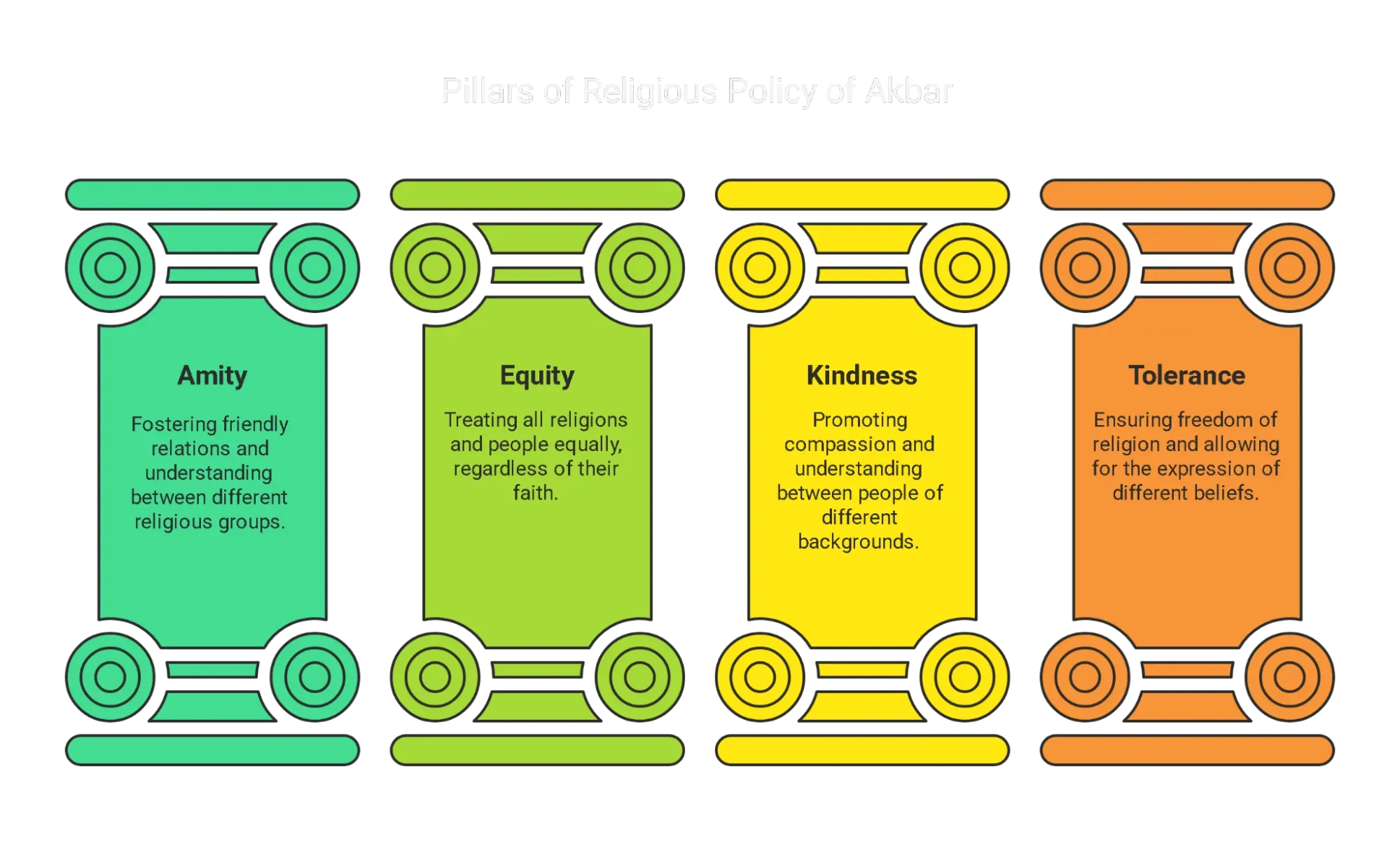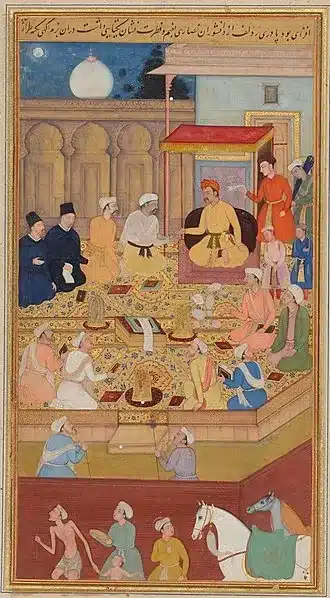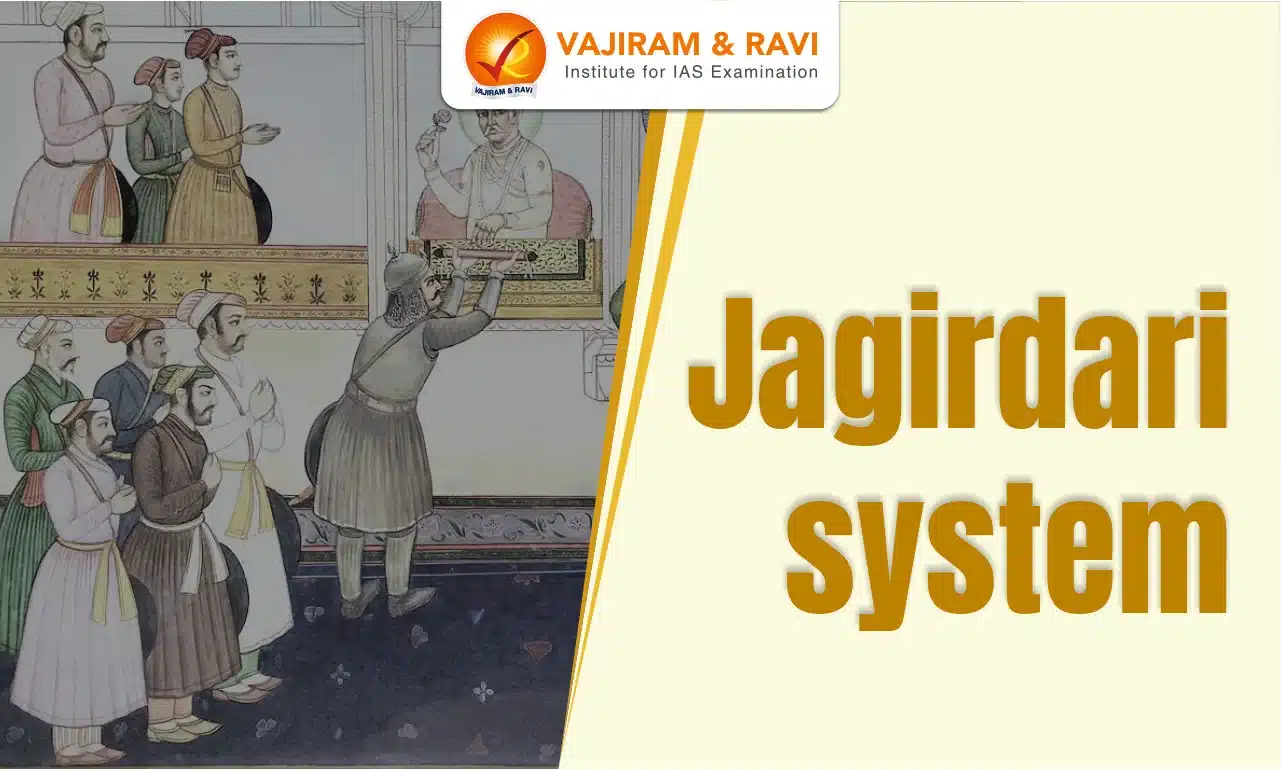Religious Policy of Akbar aimed to promote equality and respect for all religions. The basic idea of the religious policy of Akbar was universal peace and tolerance. Emperor Akbar, during his rule from 1556 to 1606, adopted various religious policies to strengthen his administration. His philosophy, Sulh-i-Kul, promoted harmony between people of different faiths.
Religious Policy of Akbar was influenced by both liberal scholars and political necessity. He established Ibadat khana for religious discussions and introduced Din-i-Ilahi, the Religion of God, in 1582. Thus, the Religious Policy of Akbar helped create an environment of harmony and goodwill between people of different faiths.
About Religious Policy of Akbar
Religious Policy of Akbar was the result of his liberal and multifaceted approach to bring about the synthesis of all religions. Akbar proposed the policy of universal peace, called Sulh-i-Kul for this purpose. In 1582, Akbar created a new faith called Din-i-Ilahi, encompassing ideas from all religions. His effort won the support of non-Muslim populations, particularly the Hindus, which demonstrated his commitment to fostering a stable and pluralistic society.
Concept of Sulh-i-Kul
Sulh-i-Kul is an Arabic term meaning absolute peace or universal peace. Akbar wanted to emphasize the social dimension of his religious thought through this principle, which encouraged unity and harmony among people of different religions and reduced religious conflicts. Akbar saw religious strife as the fundamental source of human suffering and division. Thus, proposed Sulh-i-Kul as the way to promote unity and harmony.
Pillars of Religious Policy of Akbar
Religious Policy of Akbar was guided by a series of principles that sought to unite and respect the diverse population of his empire. Akbar's concept of Sulh-i-Kul exemplified his religious policy, which was founded on four pillars mentioned below:
- Pillar of Amity: Fostering friendly relations and understanding between different religious groups.
- Pillar of Equity: Treating all religions and people equally, regardless of their faith.
- Pillar of Kindness: Promoting compassion and understanding between people of different backgrounds.
- Pillar of Tolerance: Ensuring freedom of religion and allowing for the expression of different beliefs.
Factors Influencing Religious Policy of Akbar
Religious Policy of Akbar, which included a liberal attitude toward non-Muslims, was the result of intellectual influences he encountered as a child. His mother, Hamida Banu, and his regent, Bairam Khan, played a significant role in influencing his attitude towards non-muslims. Furthermore, his tutors, Mir Abdul Latif and Munim Khan, who were free of sectarian biases, assisted him in promoting religious tolerance.
- Influence of Philosophers: Akbar was influenced by the rationalism of scholars like Shaikh Mubarak and his sons Abul Fazl and Faizi.
- Political Need: Akbar’s matrimonial alliances with Rajputs, the revocation of the pilgrimage tax, and the abolition of Jizya were a political necessity which made him more liberal towards non-muslims.
- These policies of Akbar were strategically driven to secure the support and loyalty of non-Muslims.
- Sufi and Bhakti movement: During Akbar's birth and subsequent years, Bhakti saints and Sufi peers advocated for religious tolerance. It undoubtedly influenced Akbar's religious policy. He also had an early spiritual inclination toward Sufism.
- Impact of Orthodox Ulama: Akbar disagreed with the strict interpretations of Islamic Law by Ulama. This led him to establish Ibabdat Khana to promote free discussions on various aspects of the religion by inviting scholars from all faiths.
- Proclamation of Mahzar: Akbar proclaimed Mahzar (declaration) in 1579 to signify his authority over religious matters and to move away from orthodox Ulama. This proclamation made Akbar the Khalifa of the age and the final interpreter of laws.
Religious Policy of Akbar Features
Religious Policy of Akbar promoted Hindu-Muslim harmony through policies that included the abolition of the pilgrimage tax and Jizyah tax, prohibited conversion of prisoners of war to Islam, the appointment of Hindus to higher positions, and participation in Hindu festivals. Other initiatives of Akbar include:
- Abolished Jizya Tax: He abolished the Jizya tax (a tax levied on non-Muslims) in 1564, demonstrating his commitment to equality.
- Matrimonial Alliances: Akbar established matrimonial alliances with Rajputs, marrying the daughter of Raja Bharmal to fulfill his imperialistic ambitions.
- Prohibited Religious Conversion: He put an end to religious conversions to establish friendly relations with Hindus.
- Promoted Cultural Exchange: Akbar established a translation department to promote cultural exchange. Abdul Qadir Badayuni, of his court, translated Ramayan and Mahabharata into Persian.
- Ban on Animal Slaughter: Akbar also banned the slaughter of animals during the month of Asadh and Jain Paryushhana festival. He also prohibited the killing of cows.
- Land grants: Akbar granted madad-i-ma’ash, which is land given to Hindu temples, Jains, and Persian institutions.
- Established Ibadat Khana: Akbar established Ibadat Khana in Fatehpur Sikri as a place to have debates on various religious issues, including teachings of the Kuran and Hadith, Islamic laws, nikah, and divorce, by inviting scholars of all faiths to understand the beliefs of each other.
Din-i-Ilahi
Akbar introduced Din-i-Ilahi, meaning the Religion of God, in 1582 to unite his empire under one religion by bringing together the good things from all other religions. It emphasized tolerance, Sulh-i-Kul, brotherhood, love for god, and admiration of his creatures. It showed Akbar’s desire for religious harmony.
Religious Policy of Akbar Significance
Religious Policy of Akbar was significant as it created peace and harmony among different religions during his rule. His policies like Sulh-i-Kul and the opening of Ibadat Khana helped to promote tolerance among people. The religious policies of Akbar also helped him to strengthen the Mughal Empire by establishing matrimonial ties with Hindu Rajputs. His efforts also brought some social reforms as he condemned the practice of Sati and prohibited infanticide.
Religious Policy of Akbar UPSC PYQs
Q.1 "Yogavasistha" was translated into Persian by Nizamuddin Panipati during the reign of : (UPSC Prelims 2022)
(a) Akbar
(b) Humayun
(c) Shahjahan
(d) Aurangzeb
Ans. (a)
Q.2 Ibadat Khana at Fatehpur Sikri was (UPSC Prelims 2014)
(a) The mosque for the use of Royal Family
(b) Akbar’s private prayer chamber
(c) The hall in which Akbar held discussions with scholars of various religions
(d) The room in which the nobles belonging to different religions gathered to discuss
religious affairs.
Ans. (c)
Last updated on March, 2026
→ UPSC Notification 2026 is now out on the official website at upsconline.nic.in.
→ UPSC IFoS Notification 2026 is now out on the official website at upsconline.nic.in.
→ UPSC Calendar 2026 has been released.
→ UPSC Final Result 2025 is expected to be released soon.
→ Check out the latest UPSC Syllabus 2026 here.
→ Join Vajiram & Ravi’s Interview Guidance Programme for expert help to crack your final UPSC stage.
→ UPSC Mains Result 2025 is now out.
→ UPSC Prelims 2026 will be conducted on 24th May, 2026 & UPSC Mains 2026 will be conducted on 21st August 2026.
→ The UPSC Selection Process is of 3 stages-Prelims, Mains and Interview.
→ Prepare effectively with Vajiram & Ravi’s UPSC Prelims Test Series 2026 featuring full-length mock tests, detailed solutions, and performance analysis.
→ Enroll in Vajiram & Ravi’s UPSC Mains Test Series 2026 for structured answer writing practice, expert evaluation, and exam-oriented feedback.
→ Join Vajiram & Ravi’s Best UPSC Mentorship Program for personalized guidance, strategy planning, and one-to-one support from experienced mentors.
→ Check UPSC Marksheet 2024 Here.
→ UPSC Toppers List 2024 is released now. Shakti Dubey is UPSC AIR 1 2024 Topper.
→ Also check Best UPSC Coaching in India
Religious Policy of Akbar FAQs
Q1. What is Sulh-i-Kul in the Mughal Empire?+
Q2. Which taxes were abolished by Akbar?+
Q3. What was the purpose of Ibadat Khana?+
Q4. Why did Akbar practice religious tolerance?+
Q5. What is Din-i-Ilahi?+
















